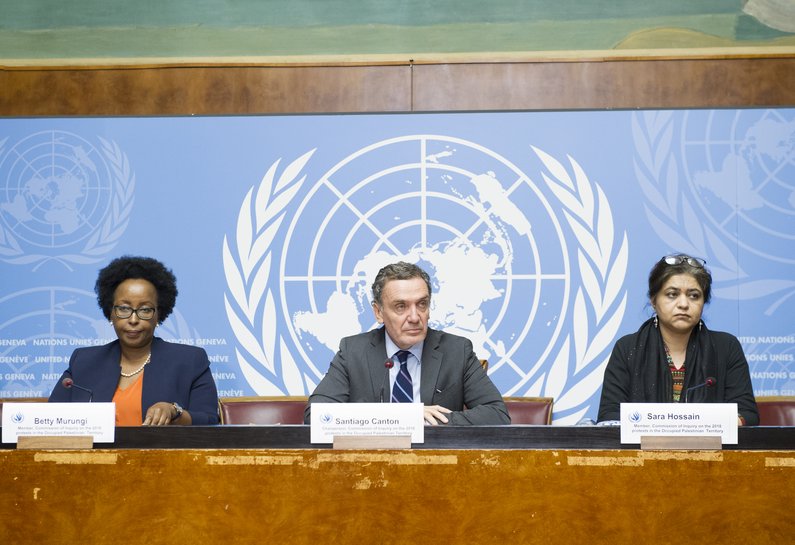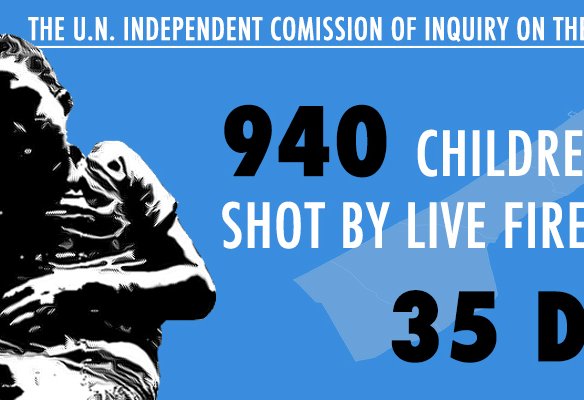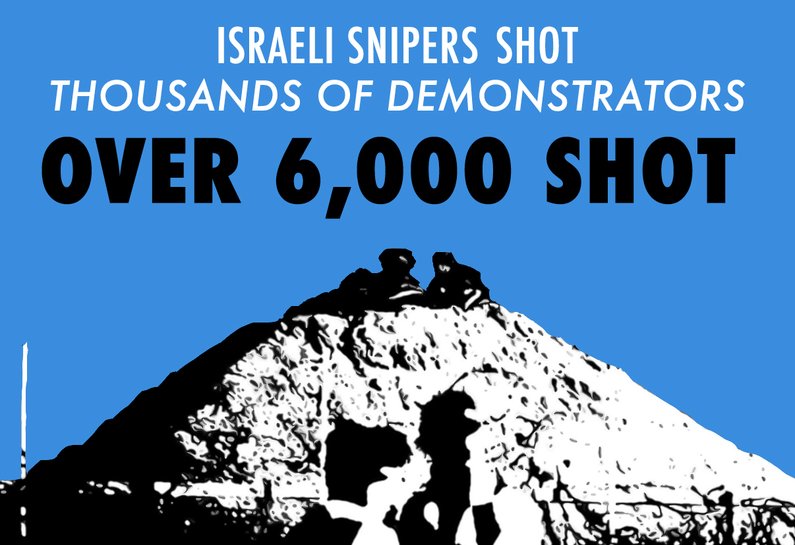UN Commission of Inquiry highlights attacks on health workers, finds ‘potential war crimes and crimes against humanity’ in Gaza

Chair of the Commission, Santiago Canton, today said that there is “reasonable grounds to believe that during the Great March of Return, Israeli soldiers committed violations of international human rights and humanitarian law. Some of those violations may constitute war crimes or crimes against humanity, and must be immediately investigated by Israel.”
Responding to the commission’s findings, MAP’s CEO, Aimee Shalan, said:
“This report shows just how devastating the past year has been for people’s lives and healthcare in Gaza. As states, including the UK, consider the Commission’s report, and their collective responsibility at the Human Rights Council, we hope they will be mindful of the appalling finding that the occupied Palestinian territory is one of the most dangerous places to be a health worker. This situation is fuelled by impunity, which is something that is within their power to put right.”
Medical Aid for Palestinians (MAP) welcomes the Commission’s recommendations, which focus on ensuring accountability and reparations for violations committed and access to medical services, and the fulfilment of the right to health of injured Palestinians.
THE COMMISSION’S REPORT IN DETAIL:
Deaths and devastating injuries
The Commission found that 189 Palestinians were killed at the demonstrations between 30 March and 31 December, with 183 killed by live ammunition used by Israeli forces. Amongst the fatalities were 35 children, three clearly marked paramedics, and two clearly marked journalists.

More than 23,313 Palestinians were injured by Israeli forces at the demonstrations in 2018, representing “the highest toll of injuries recorded in the occupied Palestinian territory since 2005.” No Israeli civilian deaths or physical injuries were reported during or resulting from the protests, though the Commission found that four Israeli soldiers were injured during the same period and one was shot dead in an incident unrelated to the protests.
Commissioner Sara Hossain told the UN Human Rights Council:
“There can be no justification for killing and injuring journalists, medics, and persons who pose no imminent threat of death or serious injury to those around them. Particularly alarming is the targeting of children and persons with disabilities. Many young persons’ lives have been altered forever.”
The report documents the life-changing injuries caused by the Israeli army’s widespread use of live ammunition, with more than 6,000 Palestinians shot at the demonstrations.

“It was striking the number of extremely similar injuries; massive open wounds in the legs, with skin and muscles ‘blown out’, bones smashed to pieces, and damage to blood vessels leading to vascular injury, putting the entire limb at risk.”
The complexity of the injuries was highlighted, with many wounded demonstrators requiring specialised, long-term medical care or orthopaedic, vascular or plastic surgery. The scale and disabling nature of injuries was outlined in the report:
“More people lost limbs during the demonstrations than during the entire Israel-Gaza conflict of 2014. As at 31 December 2018, 122 demonstrators had undergone amputations, including 20 children and a woman; of these, 98 were lower-limb amputations.”
The Commission also noted that 21 people were left paralysed after sustaining injuries to their spinal cord and nine people have suffered permanent loss of vision.
Barriers to care and Gaza’s beleaguered healthcare system
The report also highlights the barriers that many injured protesters endured when trying to access medical care unavailable in Gaza:
“As the health system in Gaza deteriorated owing to the blockade, doctors began to refer cases requiring equipment and expertise that were unavailable to hospitals in East Jerusalem, the West Bank and abroad. Israeli and Egyptian authorities denied, delayed or did not respond to several requests of persons to exit Gaza for medical treatment, with fatal consequences.”
Mass casualties have had a devastating impact on Gaza’s already fragile health system. The Commission’s report stresses that such injuries would overwhelm any country’s healthcare system, let alone hospitals in Gaza which suffer from severe shortage of medicines, equipment and fuel:
“The enormous burden of injuries from the protests has affected health care for all Gazans. After the demonstrations, hospitals were forced to divert resources away from ordinary medical needs, such as cancer treatment, obstetrics and routine operations, with far reaching effects. Approximately 8,000 elective surgeries were cancelled or postponed, resulting in a backlog that will take years to address.”
The report stresses that “[t]he right to life includes the right to a life with dignity. As the occupying Power, Israel has obligations under international law to ensure the health and welfare of the Palestinian population … the ongoing blockade of Gaza and its impact on the health-care system in Gaza, and the ensuing deprivation of essential goods and services necessary for a dignified life, including basic medical supplies, safe drinking water, electricity and sanitation, constitute violations of the fundamental rights to life and health, in particular of wounded demonstrators.”
Health workers in the firing line
The Commission’s report describes the occupied Palestinian territory as “one of the most dangerous places in the world to be a health worker”, despite the fact that “[c]ustomary and conventional international humanitarian law requires that medical personnel be respected and protected.”
The report documents the killing of three health workers were shot dead in Gaza in 2018, Musa Abu-Hassanin, Razan al-Najjar and Abdallah al-Qutati, also highlighted previously by MAP. The injuring of health workers is also recorded, with 39 shot with live ammunition, 34 hit by shrapnel/bullet fragmentation, 34 by rubber-coated metal bullets, and 85 directly hits by tear gas canisters.
Amongst the injured health workers, was Canadian-Palestinian doctor Tarek Loubani, who was shot in the legs at the protests on 14 May. Dr Loubani will be discussing his experience at a public event at Amnesty International UK in London on 14 March.
Unlawful force and impunity
The Commission found “reasonable grounds to believe” that in all but two cases “the use of live ammunition by Israeli security forces against demonstrators was unlawful”.
The report notes Israel’s failure to ensure credible investigation, accountability, or redress for violations of international law in the oPt.
“To date, the Government of Israel has consistently failed to meaningfully investigate and prosecute commanders and soldiers for crimes and violations committed against Palestinians or to provide reparation to victims in accordance with international norms.
“Scarce accountability measures arising out of Operations Cast Lead and Protective Edge and public comments by high-ranking public officials cast doubt over the State’s willingness to scrutinize the actions of military and civilian leadership who drafted, approved and supervised the implementation of the rules of engagement governing the actions of Israeli forces at the demonstrations.”
Recommendations: Time for action
The Commission calls on Israel to:
- Lift the blockade on Gaza with immediate effect;
- Ensure that all those injured at demonstrations are permitted prompt access to hospitals elsewhere in the occupied Palestinian territory, in Israel or abroad;
- Ensure timely access of medical and all other humanitarian workers to Gaza, including to provide treatment to those injured in the context of demonstrations;
- Ensure efficient coordination for entry of medical items and equipment into Gaza, and remove the prohibition of entry applied to items with legitimate protective and medical uses, including carbon fibre components for the treatment of limb injuries.
The Commission recommends that the de facto authorities in Gaza and the Palestinian Authority ensure timely and efficient coordination for the entry of medical supplies and equipment into Gaza.
It also recommends UN Member States and civil society support the health-care system in Gaza, particularly with the resources necessary to treat injuries incurred at the protests.
On 22 March, Member States, including the UK, will have an opportunity to vote on a resolution supporting the implementation of the Commission of Inquiry’s recommendations. MAP calls on Member States, including the UK, to support the Commission and its findings, and ensure the protection of health workers and healthcare in Gaza.
Image: COI Commissioners (from left to right): Kaari Betty Murungi; Sara Hossain & Santiago Canton (Chair) © OHCHR
Related content


